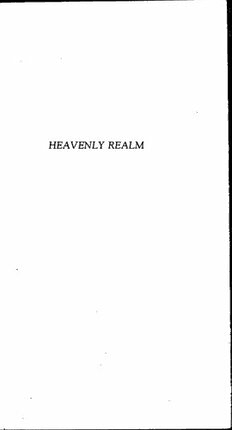Table Of ContentHEAVENLY REALM
HEAVENLY
REALM
LAY SERMONS
by
FATHER SERAPHIM ROSE
ST. HERMAN OF ALASKA BROTHERHOOD
PLATINA, CA. 1984
Copyright 1984
by St. Herman of Alaska Brotherhood
Father Seraphim in 1977
Eugene Dennis Rose, the future Father
Seraphim at the time he wrote these essays.
CONTENTS
Preface............................................................9
Introduction:
Fr. Seraphim’s Beginnings as an Orthodox
Writer.......................................................13
’ Lay-Sermons:
1. The Great Fast, Our ^xile.....................21
2. Many Are Called, But Few Are Chosen 23
3. The Meaning of Affliction.....................25
4. Christian Love........................................27
5. God is Fire..............................................30
6. The Other-Worldliness of Holy
Orthodoxy................................................33
7. The Veneration of Icons in Holy
Orthodoxy................................................35
8. The Prayer of the Good Thief................38
9. The Ascension of Our Lord....................40
10. The Fear of God......................................42
11. St. John of Kronstadt ............................45
12. The Radiant Feast .................................48
13. The Feast of Mid-Pentecost....................51
14. On the Transfiguration of Our Lord ... 53
15. Archimandrite Sebastian Dobovich .... 56
16. The Transfiguration...............................58
17. St. John, A Prophet...............................61
18. The Weeping Icons.................................64
19. The Aims of the Orthodox World..........67
20. Tsar-Martyr.............................................72
21. The Future of Russia..............................80
22. Heavenly Realm.....................................101
7
L
Eugene Rose at his
Pomona College graduation
in 1956.
PREFACE
Father Seraphim (1934-1982), Eugene Rose,
before monasticism was a very perceptive and sen
sitive young man, highly talented in many fields:
philosophy, science, mathematics. linguistics,
literature, music and theology. It was mostly his
philosophically analytical mind that made his col
lege years so full and intense in achievements. His
unquenchable thirst for the Truth led him to the
threshold of True Christianity, the Universal Orth
odoxy. But at first it was for him too abstract to be
able to engross himself into it totally. He really was
more a realist than an idealist, and he certainly
hated the spineless “academic Orthodoxy,” of the
modern school, which barred him from ente-ring
into the very heart of the living contact with Christ
through the experience of the Mysteries and Patris
tic otherworldliness that the Church lives by. This
heavenly realm of Traditional Apostolic Orthodoxy
was not opened to him until some living represen
tatives of contemporary monasticism, out of the
9
HEAVENLY REALM
martyric Russian Church, enter ed into his life,
he ground of his heart through personal suffering
was now ripe. His study and his deep understand-
ing of the “Mystery of Iniquity” of our Post-Chris-
A"'* '^hen he knew
that this long sought-after realm was opening be-
orc him, he accepted the fullness of Christ whole-
heartedly.
And at once he began to bring forth fruit with
his mighty pen, sharing this priceless acquistition
", “ntemporaries, consciously leading them
into this heavenly realm. To this he dedicated the
rest of his short but full life.
The proof that all this was genuine is that he
henceforth bore fruit an hundredfold in the vine
yard of Christ; fruits literary, missionary, monas-
Ih oTL ’’’’ to
all Orthodox Americans - apparently even sanc-
‘ y 1 outstanding contemporary theologian
’“^^tklexander Schmemann, having served a
panMida for Father Seraphim, said, “here is a
man to whom belongs the future.”
In this book we present his little 20 essays
so-called ‘lay sermons,” his earliest Orthodox wrib
■ngs produced in the early 1960’8. Although much
too bnef and limited, they clearly indicate and with
t,.„,„nstra(e both the spiritual impact
Orthodox Spirituality was making on him, as well
as the desire to put his share in leading others into
his newly-discovered heavenly realm.
10
HEAVENLY REALM
To the non-Orthodox reader this little book
)f the “early Father Seraphim” might not give an
mpression of the full magnitude of his impact on
18 young Americans. But the wonder of a soul of a
20th century modern young man who managed
somehow to penetrate into the realm of the nch
^Byzantine Tradition, then to become genuinely
i saturated by its divine splendor, and finally to e-
merge as a living link with the Church Fathers -
is in deed awesome!
Who would suspect that our prosaic America
could produce such a visionary?
Timothy Gorokhov
Pascha 1984

